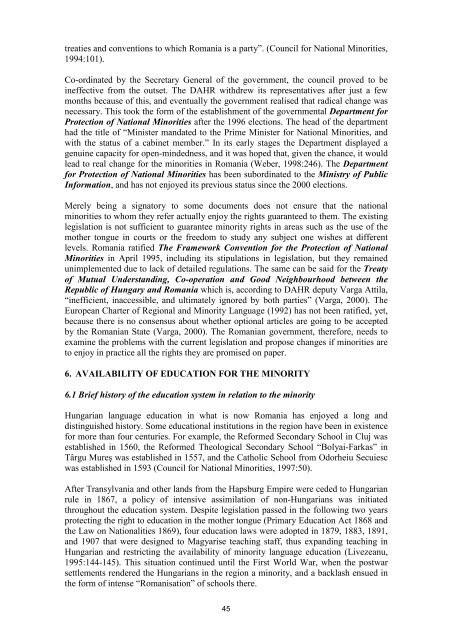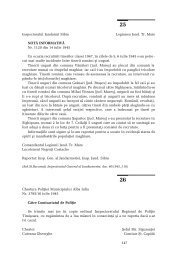Southeast Europe
Southeast Europe
Southeast Europe
Create successful ePaper yourself
Turn your PDF publications into a flip-book with our unique Google optimized e-Paper software.
treaties and conventions to which Romania is a party”. (Council for National Minorities,<br />
1994:101).<br />
Co-ordinated by the Secretary General of the government, the council proved to be<br />
ineffective from the outset. The DAHR withdrew its representatives after just a few<br />
months because of this, and eventually the government realised that radical change was<br />
necessary. This took the form of the establishment of the governmental Department for<br />
Protection of National Minorities after the 1996 elections. The head of the department<br />
had the title of “Minister mandated to the Prime Minister for National Minorities, and<br />
with the status of a cabinet member.” In its early stages the Department displayed a<br />
genuine capacity for open-mindedness, and it was hoped that, given the chance, it would<br />
lead to real change for the minorities in Romania (Weber, 1998:246). The Department<br />
for Protection of National Minorities has been subordinated to the Ministry of Public<br />
Information, and has not enjoyed its previous status since the 2000 elections.<br />
Merely being a signatory to some documents does not ensure that the national<br />
minorities to whom they refer actually enjoy the rights guaranteed to them. The existing<br />
legislation is not sufficient to guarantee minority rights in areas such as the use of the<br />
mother tongue in courts or the freedom to study any subject one wishes at different<br />
levels. Romania ratified The Framework Convention for the Protection of National<br />
Minorities in April 1995, including its stipulations in legislation, but they remained<br />
unimplemented due to lack of detailed regulations. The same can be said for the Treaty<br />
of Mutual Understanding, Co-operation and Good Neighbourhood between the<br />
Republic of Hungary and Romania which is, according to DAHR deputy Varga Attila,<br />
“inefficient, inaccessible, and ultimately ignored by both parties” (Varga, 2000). The<br />
<strong>Europe</strong>an Charter of Regional and Minority Language (1992) has not been ratified, yet,<br />
because there is no consensus about whether optional articles are going to be accepted<br />
by the Romanian State (Varga, 2000). The Romanian government, therefore, needs to<br />
examine the problems with the current legislation and propose changes if minorities are<br />
to enjoy in practice all the rights they are promised on paper.<br />
6. AVAILABILITY OF EDUCATION FOR THE MINORITY<br />
6.1 Brief history of the education system in relation to the minority<br />
Hungarian language education in what is now Romania has enjoyed a long and<br />
distinguished history. Some educational institutions in the region have been in existence<br />
for more than four centuries. For example, the Reformed Secondary School in Cluj was<br />
established in 1560, the Reformed Theological Secondary School “Bolyai-Farkas” in<br />
Târgu Mureş was established in 1557, and the Catholic School from Odorheiu Secuiesc<br />
was established in 1593 (Council for National Minorities, 1997:50).<br />
After Transylvania and other lands from the Hapsburg Empire were ceded to Hungarian<br />
rule in 1867, a policy of intensive assimilation of non-Hungarians was initiated<br />
throughout the education system. Despite legislation passed in the following two years<br />
protecting the right to education in the mother tongue (Primary Education Act 1868 and<br />
the Law on Nationalities 1869), four education laws were adopted in 1879, 1883, 1891,<br />
and 1907 that were designed to Magyarise teaching staff, thus expanding teaching in<br />
Hungarian and restricting the availability of minority language education (Livezeanu,<br />
1995:144-145). This situation continued until the First World War, when the postwar<br />
settlements rendered the Hungarians in the region a minority, and a backlash ensued in<br />
the form of intense “Romanisation” of schools there.<br />
45









